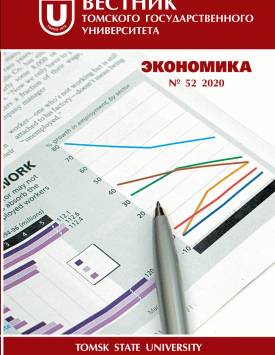Forming an Adaptive Methodology for Regional Development in the Context of the Smart City Concept
In the face of the uncertainty and instability of the external economic and geopolitical environment, Russian regions face the urgent task of forming an effective model of territorial development to ensure sustainable economic growth and improve the quality of life. The concept “smart city” is widely spread not only in academic and expert circles, but also in the sphere of practical application and implementation in the social and economic life of modern regions as a promising development model. The authors aim to substantiate the theoretical and methodological provisions and tools of the adaptive methodology of modern regional development in the transition to the concept of smart city. Dialectical and system approaches, general scientific methods of retrospective, situational, comparative, factor analysis, content analysis of scientific literature, economic-statistical, comparative, analytical methods of research were used to achieve the aim and solve the problems. The research approach is based on the theoretical and methodological provisions and tools of the adaptive methodology of modern regional development in conditions of transition to the concept of smart city. The focal point of the smart city concept is people - involved subjects interested in applying this concept in solving local problems. The ability to conceptually connect different spheres of life of the population, business units and representatives of public administration depends on the level (strategic, tactical, operative) and methods of their mutual communication, information and experience exchange, innovativeness. A reasonable approach should result in a balanced and functional decision for the given task. Then the main tool of the intellectual approach is a transparent and open information platform, and the main tool is an open and highly effective communication at the level of social dialogue between all involved urban development participants. The authors conclude that the smart city is a future challenge, a model of a city where technology serves people and improves the quality of their economic and social life. At the same time, decisions made in smart cities are not limited to technology, but require active involvement of the population in “smart development”. Besides, it is necessary to understand that there is no reference model of “smart city” development, each individual case requires an individual approach.
Keywords
adaptive methodology, smart city, regional development, digital technology, infrastructure, Internet of things, sensors, big dataAuthors
| Name | Organization | |
| Akimova Olga E. | Volgograd State Technical University | akimovann25@mail.ru |
| Volkov Sergey K. | Volgograd State Technical University | ambiente2@rambler.ru |
| Kuzlaeva Irina M. | Guarantee Fund of Volgograd Region | kmn07@mail.ru |
References

Forming an Adaptive Methodology for Regional Development in the Context of the Smart City Concept | Vestnik Tomskogo gosudarstvennogo universiteta. Ekonomika – Tomsk State University Journal of Economics. 2020. № 52. DOI: 10.17223/19988648/52/3
